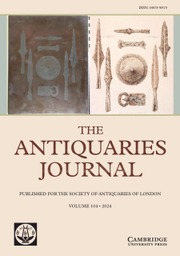No CrossRef data available.
Article contents
Extract
As I walked down Piccadilly one Thursday afternoon not long ago, I saw a notice outside our parish church announcing that a famous musician was to address a lunch-time audience on the subject of ‘The Virtues of Silence’. Rather ruefully I reflected that such virtues are not permitted to Presidents at Anniversary time; and so my fancy lightly turned to thoughts of the Address to be delivered to you today. For all that silence may be golden, none the less speech is silvern, and how better may I preface my remarks on this particular occasion than with the expression of a heartfelt salute to the Silver Jubilee of our Royal Patron, Her Most Sacred Majesty Queen Elizabeth the Second? We who are, as it were, second generation Elizabethan antiquaries shall be sharing in the national jollifications and observing them in our own traditional fashion later this evening; and I shall then take the opportunity of reading to the assembled company the text of the Loyal Address which the Society will be transmitting to Her Majesty. Only a fortnight ago, and within but a few days of Her Majesty's return from Australia and New Zealand, it was my privilege to be amongst those gathered to witness the Queen distribute the Royal Maundy in Westminster Abbey, surely as moving a testimony to the continuity of our institutions, and to our Sovereign Patron's personal devotion to them, as any antiquary could wish; indeed to one of those present it recalled a far, far earlier ceremonial connected with queens and the abbey, recorded in a chance reference of 1246 to Henry III requesting the chaplains of London to celebrate, and I quote, ‘the anniversary of the three queens buried at Westminster’, that is to say Sebert's Queen Ethelgotha (d. 615), Edward the Confessor's Queen Edith, and Henry I's Queen Matilda (d. 1118): a piece of ‘mere antiquarianism’ perhaps, but one surely not unbefitting our own anniversary.
- Type
- Research Article
- Information
- Copyright
- Copyright © The Society of Antiquaries of London 1977
References
NOTES
1 Calendar of Liberate Rolls, iii, 19. When Amadeus of Savoy visited England in the summer of 1292 to go to Berwick on Tweed for the hearings of the Great Cause, the account of his household expenses includes a payment of 60s. ‘pro tribus pannis aureis qui positi fuerunt in adventu dominiapud Londonias supra tumbas reginarum’ (Turin, Archivio di Stato, Sezioni Riunite, Savoia Inv. 38, f. 21, Masso II, no. 9).
2 Colvin, H. M. (ed.), History of the King's Works (1963), ii, 864Google Scholar.


